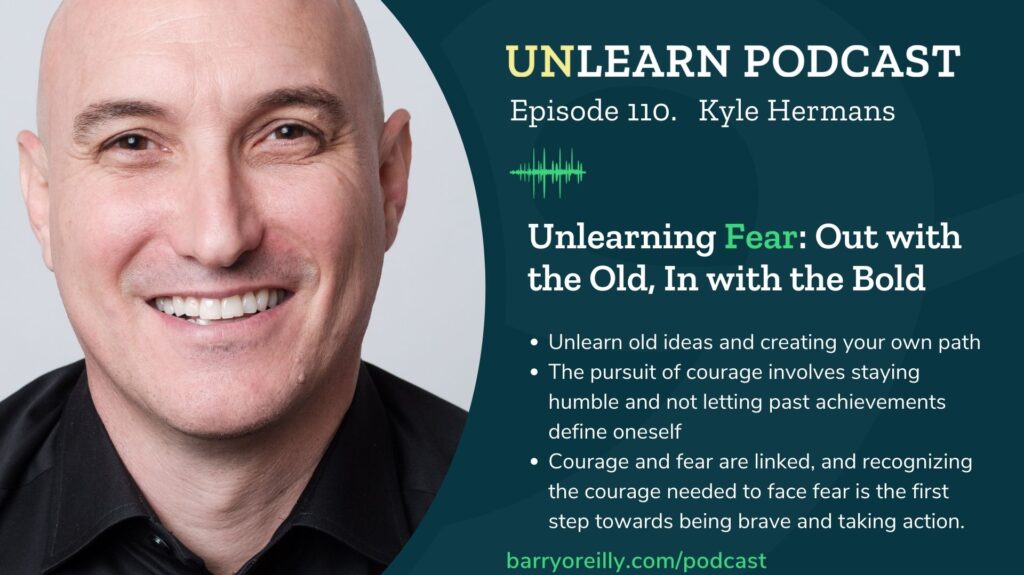Kyle Hermans is the CEO and co-founder of Be Courageous, a globally recognized business consultancy that helps ambitious leaders and brands grow and transform. They do this through improving company culture, strategy, innovation, technology, research, and ESG/SDG. Kyle has led transformation initiatives for hundreds of Fortune 1000 companies and startups throughout his distinguished career. He is a faculty member at Singularity University and a guest lecturer at several prestigious institutions such as Berkeley, USC, and UCLA. Kyle joins Barry O’Reilly to explore the concept of courage, the necessity of unlearning and relearning, and how these ideas have shaped his personal and professional life.
A Long Way From Home
Kyle’s father bought him a one-way ticket from his native South Africa to the Netherlands, where he experienced a big culture shock. This was his first encounter with the idea of courage and unlearning. In the Netherlands, everything was different and he had to forget his old ideas about the world. He said, “Everything I ever thought about my reality [was] just gone.” After adjusting to his new life, Kyle got different jobs in business, including consulting and being an executive at design agencies. But he found out that his energetic personality and quick ambition didn’t match the usual corporate way of working. This led to his decision to make his own way to fully reach his potential, which he calls his “Schiphol Moment”. This decision led him to his current job at Be Courageous. There, he explores courage, creativity, and transformative leadership in professional situations. [Listen from 1:20]
Barry underscores the transformative power of courage, linking it to the larger theme of unlearning. He shares how his exposure to different corporate environments helped shape his understanding of the concept. [Listen from 7:20]

Courage is Creativity
Kyle’s connection to the notion of courage began while working at an innovation agency called Synectics, which heavily influenced the origins of design thinking. He used the quote, “Another word for creativity is courage” in hundreds of workshops around the world. This quote resonated with Kyle, encouraging him to seek out his ‘Schiphol moments’—intentionally placing himself in unfamiliar environments to shock the system and trigger growth. “The pursuit of courage is staying humble,” he shares, “I’m not going to get too trapped by the things I’ve done or be too defined by where I’ve been.” Kyle believes that everyone harbors an unexpressed idea or dream within them, the pursuit of which demands a great deal of courage, particularly in hostile, difficult, and vulnerable conditions. Showing up to transformative experiences and attempting to effect change within successful organizations is an act of courage in itself, according to Barry, given the immense pressure to conform to pre-existing systems. “Creation is actual courageousness,” he remarks. [Listen from 9:30]
But What Is It, Really?
Kyle first got interested in courage while working at Synectics, an innovation agency. He often uses the quote, “Another word for creativity is courage” in his workshops worldwide. This quote inspired him to find his ‘Schiphol moments’— purposely putting himself in new situations to grow. He says, “The pursuit of courage is staying humble. I’m not going to let my past achievements or experiences define me.” Kyle thinks that everyone has an unspoken dream or idea, and chasing it requires a lot of bravery, especially in tough and vulnerable situations. For Barry, just trying to make changes in successful organizations is courageous, as there’s a lot of pressure to stick with the current systems. He says, “Creation is actual courageousness.” [Listen from 16:05]
Barry talks about the many factors that contribute to success: it’s not just about timing, location, or people, but a mix of many elements, he says. He also discusses how hard it can be to change ways of thinking in companies and deciding where to focus efforts for the best outcomes. He recommends paying attention to areas that already have momentum, instead of trying to transform parts that are resistant to change. [Listen from 22:15]
Courage Is Not the Absence of Fear
Kyle believes that courage is a quality that everyone can choose to have, not just a mental trait. He says, “Where there is fear, there is courage, and where there is courage, there is fear.” He emphasizes that fear and courage are linked, and people often forget that courage can be found when facing fear and self-doubt. He asks, “What’s the courage needed in this moment?” Recognizing the courage needed to beat fear is often the start of becoming brave. Kyle talks about being intentional, having a purpose, being curious and open, taking risks, and being selfless. He emphasizes that these qualities come out when people decide to confront their fears and tackle challenges directly. These traits enable people to take responsibility, direct their actions, and embrace the unknown. Most notably, he mentions, “The fastest way to bring courage into your world is to accept what is.” [Listen from 25:00]
Barry reflects on the concept of courage in approaching work, especially tasks that are difficult or incite fear. He acknowledges how easy it is to focus on easier tasks, yet he also recognizes the necessity of addressing the more daunting ones. He mentions the importance of identifying fears related to tasks, and the courage needed to tackle them. “The [insight] that sort of struck me instantly was… ‘where do I need courage today?’ It’s a great framing question… It has helped me zero in on the difficult conversation I know I need to have today. And it’s encouraged me to do the work, to be able to have that conversation, to make the real progress on this list,” he shares. [Listen from 34:10]
Looking Ahead
Kyle reminds listeners of the bridge between courage and unlearning. “We must unlearn that fear is the only way to design our lives,” and choose to see life through a lens of courage instead, he shares. [Listen from 38:10]















